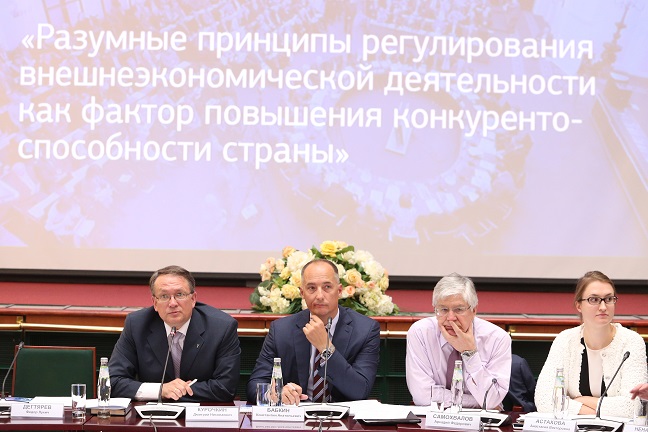
Published: June 20th, 2016
Today, in the Congress Hall of the RF CCI, the second meeting of the Council on Industrial Development and Competitiveness of the Russian economy on the theme "Reasonable principles of foreign economic activity regulation as a factor in increasing the country's competitiveness" was held.
At the meeting, Konstantin Babkin the Chairman of the Council voiced his proposals for economic policy and the regulation of foreign economic activity of the country, as well as export and import policy.
Thus, according to Mr. Babkin, the main goal of the socio-economic development of Russia up to 2030 should be a new industrialization. Measures for import substitution industry and export support will ensure domestic economic security of the country and create alternative sources of raw material exports.
"The implementation of anti-crisis measures, specific export support measures, investment, import substitution without orientation on the main goal will allow only temporarily to mask the existing problems, but not to solve them" - Babkin said.
To move to a new economic policy the development of the manufacturing sector and move from a fiscal incentive to foreign economic policy should be set as a priority. Expansionary economic policies, in turn, should be systematic, that is, implemented simultaneously in all areas of state regulation of economic activity. So, it is impossible to address issues of state regulation of foreign trade activities pursued in isolation from domestic industrial policy, the development of non-oil exports without creating conditions that encourage the development of industries with high added value in the domestic market.
Stimulating economic regulation in the area of foreign trade policy should aim to equalize competitive conditions between Russian and foreign manufacturers. Necessary to develop non-tariff support measures that take into account the specifics of the functioning of an industry (tax burden, the cost of credit resources, energy and components, logistics, administrative expenses and so on.), Or in the absence of such an opportunity - raising import duties, taking into account the level of tariff protection required for each individual type of product. At the heart of enabling policies on the regulation of foreign trade should be clear alignment of priorities of industrial development, classification and prioritization of development of economic sectors.
An active and large-scale funding of public export credit programs (currently only available in the WTO rules an instrument of financial support for exports) should become the principles of implementation of stimulating economic policy in the field of regulation of foreign trade; cardinal revision of the policy of the Russian Federation's participation in the WTO, which entails a withdrawal from the organization, or the alignment of the active strategy of international trade negotiations, which is currently lacking; more efficient use of the mechanism of government procurement of domestic products; priority to the implementation of joint projects, the development of industrial cooperation with the Member States EAEC, develop a joint strategy for international trade negotiations to jointly safeguard the interests of the EAEC at the site of the WTO.
One of the key issues of the agenda of the Council, was the new edition of the Action Plan ("Roadmap") "Support for access to foreign markets and export support." CCI Council Offers concerned as adjustments of existing "road map" of items and new development.
For example, a. 8 of the Road Map provides for the financing of imported products containing the Russian components. Council members believe that would be more relevant to support Russian components production and exports direct, instead of directly subsidizing imports, which will cause further damage to Russian manufacturers.
Article 49 of the Draft Law "On export support." At the moment, the law is declarative framework nature and does not contain required support measures to meet global practice of export. For example - related funding when funding Russian partner countries are directly linked with the supply to these countries of Russian industrial products. Or the subsidy mechanism of leasing services exports - much needed mechanism in countries where it is difficult to obtain credit facilities. Not to mention the political support of exports, when the representatives of the authorities at the highest level promote the national products in international meetings, such as "Bush legs" or as the Belarusian tractors. Council members propose to introduce the use of all varieties of export support measures such as export insurance and guarantee transactions, provide information and consulting support, compensation costs for maintenance of exhibition and fair activities and so on.
At the meeting of the Council on Industrial Development and Competitiveness of the Russian economy on the theme "Reasonable principles of foreign economic activity regulation as a factor in increasing the competitiveness of the country" was attended by representatives of all agencies responsible for the preparation of the "road map": Russian Ministry of Finance, Ministry of Industry, Ministry of the Economy, Vnesheconombank, the Russian export Centre and ASI.
Also, members of the Council had considered a proposal of the Republic of Belarus to increase the rates of import customs duties from 0 to 5% against machines injection molding (injection molding machines, TN VED code 847710). The result was a decision to support the approach of the Republic of Belarus on improving customs-tariff protection for products whose production is established or planned to be launched on the territory of the EAEC and indicate the need to promote cooperation of producers of the Member States EAEC.
Source: MEF PR departement
Latest news
07.05.2018 MEF-2018: debate "Cultural policy: between individual freedom and the interests of society?"
07.05.2018 MEF-2018: Conference No. 8
07.05.2018 MEF-2018: Conference No. 4
07.05.2018 MEF-2018: Conference No.3
07.05.2018 MEF-2018: Conference No. 2
07.05.2018 MEF-2018: Conference No.1
26.04.2018 McConnell Discusses Information Warfare
20.04.2018 MEF-2018: closing plenary session
17.04.2018 Mr. Freysinger: «Skripal’s case» for relationship between Russia und European Union?
